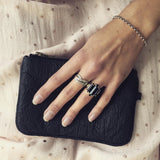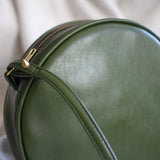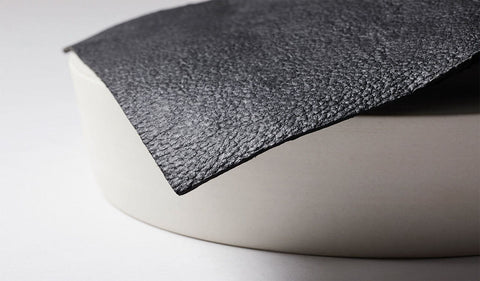Love it or hate it, vegan leather is a good catch-all term for faux (fake) leather fabrics like the ones we use here at Velvet Heartbeat. So what are they made of?



PU is a fabric made from one or more layers of polymer resins joined by urethane links; and a textile backing such as polyester, cotton, or nylon.
VINYL/PVCIt is a type of plastic that is made from ethylene (found in crude oil) and chlorine (found in regular salt). When processed, both the substances are combined to form Polyvinyl Chloride (PVC) resin, or as is commonly referred to - Vinyl. This, like PU is added to a textile backing to form a fabric.
“So this doesn’t sound all that environmentally friendly” I hear you say, and it’s true! while we do use both of these textiles in constructing our bags we have tried to keep it to using mostly deadstock (industry surplus) or scrap in order to prevent these textiles from heading to landfill.
So what are the alternatives? Traditional animal leather isn’t an option for us because we can’t get past the cruelty of using animals for fashion (or food!). The next alternative is plant based!

Firm favourite (check out our range here), Piñatex® is made from the leaves of the pineapple plant, a former waste byproduct of the pineapple farming industry making it super sustainable, plus it gives pineapple farmers an additional source of income to process the leaves

Love at first sight! (check out our range here), Desserto cactus leather is a brand new textile innovation direct from Mexico. Only the mature leaves of the Nopal cactus are selected so the plant is not damaged and a new harvest can be made every 6-8 months. No irrigation, herbicides or pesticides are required and the cactus can grow with minimal rain water and the natural mineral rich land in the plantation.

We already know the Italians are great with food so it should come as no surprise they are coming up with some amazing innovations for food waste too! (see also Orange Fibre), Hannes Parth, the CEO of Frumat was working on a solution for dealing with apple waste on an industrial scale, starting with apple paper and then arrived at apple leather! (read more here). We have our own beautiful range made from apple leather provided by Vegatex here, An innovative and highly sustainable hybrid material which integrates organic apple peel waste from juice manufacture, making it an eco friendly leather alternative for those who care about the environment and animals - certified 66% Biobased content.

Made from mycelium which is the fibrous root system of mushrooms and grown in a skin formation in a controlled environment. A number of companies are working with this technology like Bolt Threads who are due to release a mushroom leather handbag with Stella McCartney. The rest of us will have to wait for a broader release to start working with this textile though!

Modern Meadows have eliminated the need to resort to animal cruelty at all by using collagen producing yeasts to build leather in a lab! This textile still a while from being commercially available but it certainly feels exciting that we could essentially have the same fabric without all the death! Read more here

A newly developed biocomposite material made from entirely organic and sustainable bacterial cellulose, grown on agricultural waste sourced from the coconut industry in Southern India. It is then dyed with various natural plant dyes to provide different colour options!
So with all these options why would you go with traditional leather? Some people say it’s better because it is better for the environment than traditional faux leathers PU or Vinyl, and that it is more sustainable as it is a byproduct of the meat industry. While there may be some truth in those claims it is important to note that both farming and most tanning techniques are quite polluting, traditional tanning uses harsh chemicals such as chromium salts, formaldehyde and more which end up in waterways and aren’t too nice for workers to deal with either. That in addition to the increase in people adopting plant based diets in favour of red meat worldwide seems to suggest we need better alternatives to be kinder to the planet no matter where you stand on animal rights.
Of course as we always say you’ve got to choose based on your own set of ethics and do your research on any product you buy to make sure it aligns with your values! Here is a pretty balanced article if you want to read more!
So what do you think? Have you heard of a new innovation we’ve missed? got any other burning questions? hit us up in the comments or drop us an email!
xx Suzie



